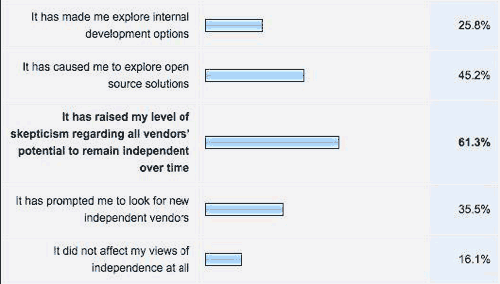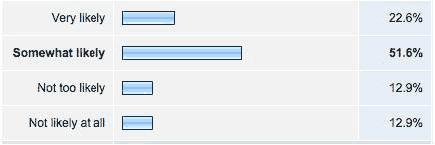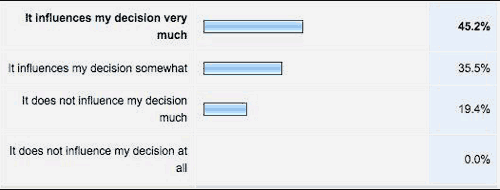Senior Analyst,
Common Sense Advisory
In late mid-2008, Common Sense Advisory asked buyers of translation services for their views on technology independence among their software and language vendors. Over half the 30-plus respondents hailed from North America; 35 percent were from Europe; the balance were scattered across that amorphous continent known as "Rest of World."
Our first question asked, "How important is it for your technology vendor to be a different company than the firm that provides translation services?" About 60 percent said technology independence was "somewhat important" or "very important."

Source: Common Sense Advisory, Inc.
Stated more bluntly, we were asking buyers what they felt about using technology tied to a specific language services provider (LSP), such as Lionbridge, Sajan, SDL, or Translations.com. Given the high proportion of "very important" responses coupled with zero buyers stating "very unimportant," the balance of opinion among buyers tilts radically toward concern on this topic, even though 39 percent said it was "not important."
Next, we asked buyers if a guarantee of independence from the vendor would influence their purchasing decision. Over 80 percent indicated that it would.

Source: Common Sense Advisory, Inc.
Expect non-service vendors to take advantage of this buying criterion, in both marketing platitudes and in the more hand-to-hand combat of direct selling. However, not all buyers will take such promises at face value. Last year, two notable independent software companies, Alchemy and Idiom, were swallowed by large LSPs (Translations.com and SDL, respectively). When we asked how recent mergers and acquisitions (M&A) had affected their views regarding vendor independence, 60 percent of buyers told us industry consolidation had raised their skepticism about any vendor's ability to remain independent over time.
Other reactions included 25 percent who said they were pushed to explore internal development options; 35 percent who set off to look for new independent vendors; and 45 percent for whom it triggered an exploration of open source solutions. Only 16 percent say the consolidation did not alter their views on vendor independence.

Source: Common Sense Advisory, Inc.
But apparently many companies did not need M&A activities to trigger their interest in open source. When we asked if it was likely their company would use open-source software for translation automation projects, nearly three out of four said they are "somewhat likely" or "very likely" to do so. This receptiveness could bode well for an open-source Global Sight — if Welocalize succeeds in mobilizing a community and eliciting a sense of ownership beyond itself.

Source: Common Sense Advisory, Inc.
Fewer companies are developing their own solutions for translation automation. Half said they were not, 30 percent said they were, and 20 percent claimed to be thinking about it.
Translation Buyers' Views on Technology Independence
Source: Common Sense Advisory, Inc.
So, our survey comes down to two conflicting datapoints:
* Our research on translation management systems (TMS) shows that most high-scoring systems are offered by language service providers, not by independent software vendors (ISVs). Suppliers such as Lionbridge, Sajan, SDL, and Translations.com are not only LSPs, but leading proponents of TMS in the openly available enterprise or captive "house" categories (house systems are available only through service agreements with those LSPs).
* However, buyers unequivocally tell us they worry about vendor independence and that it affects buying decisions.
This cognitive dissonance explains the difficult selling environment that LSPs find themselves in when pushing their proprietary technology approaches. And why unaffiliated software vendors have clay feet when it comes to the question of independence. Across, Beetext, and Kilgray have no financial ties to LSPs — yet. Maybe these new players will be the ones who finally turn the corner and prove that ISVs can survive in this service-oriented marketplace. But over the last decade, LSPs have harvested pretty much every leading software vendor in the space — more than 10 companies in all. Common Sense Advisory anticipates that acquisition by an LSP is still the most likely "exit strategy" for any globalization software vendor (GSV) operating today.
Published - April 2009
ClientSide News Magazine - www.clientsidenews.com
Corporate Blog of Elite - Professional Translation Services serving ASEAN & East Asia







No comments:
Post a Comment